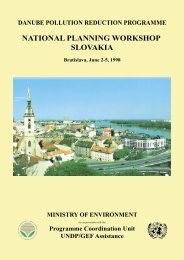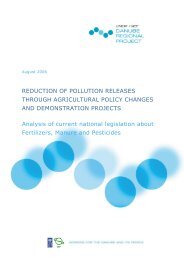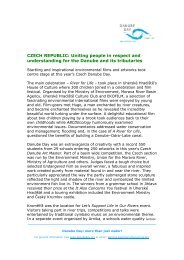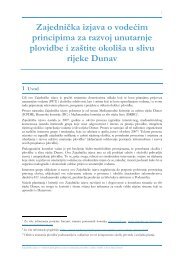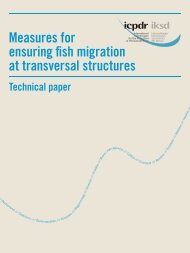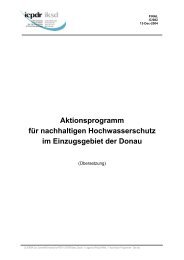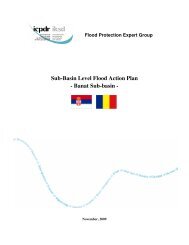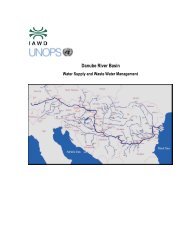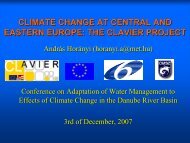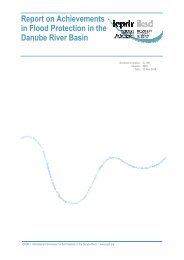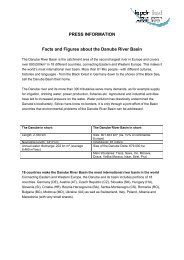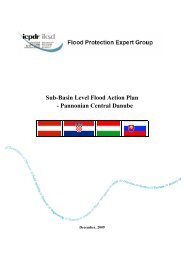Technical Reports Parts C,D - ICPDR
Technical Reports Parts C,D - ICPDR
Technical Reports Parts C,D - ICPDR
Create successful ePaper yourself
Turn your PDF publications into a flip-book with our unique Google optimized e-Paper software.
138 Danube Pollution Reduction Programme – National Review, Ukraine<br />
Limits for water extraction and polluting substances discharge are specified in the permit for<br />
special water use. In case of low water, limit for water extraction could be reduced by specially<br />
authorized bodies without correction of the permit for special water use.<br />
Terms of special water use are established by bodies, which issued the permit for special water use.<br />
Special water use can be short-term one (up to 3 years) or long-term one (three to twenty-five<br />
years).<br />
Term of special water use could be prolonged for the period that does not exceed relevant shortterm<br />
or long-term water use, if necessary. Prolongation of special water use terms by the petition of<br />
interested water users is carried out by the state bodies that issued permit for special water use.<br />
2.5.3. Monitoring<br />
The state water monitoring is conducted with the aim of ensuring collection, processing, storage,<br />
and analysis of the information on the condition of waters, prediction of its changes, and<br />
development of the recommendations for making scientifically substantiated decisions in the field<br />
of water usage and protection and water resources restoration.<br />
Subjects of the state water monitoring are as follows:<br />
<br />
<br />
<br />
<br />
<br />
<br />
<br />
surface waters;<br />
natural water bodies (lakes), water courses (rivers, streams);<br />
artificial water bodies (reservoirs, ponds), channels and other water bodies;<br />
groundwater and springs;<br />
internal sea waters and territorial sea; exclusive Ukrainian (marine) economic zone;<br />
sources of water pollution, including wastewater; accidental discharges of liquid products<br />
and wastes; products and material losses in a process of mineral resources extraction<br />
within aquifers of surface waters, internal sea waters, territorial sea waters and exclusive<br />
Ukrainian (marine) economic zone; as well as dumping of wastes, waters of surface<br />
drainage from the agricultural fields, filtration of pollutants from technological water<br />
bodies and reservoirs; and massive growth of the blue-and-green algae;<br />
release of harmful substances from sediments (secondary pollution), and other sources of<br />
pollution, which could be subject to observation.<br />
There are approximately 1.000 sanitary and hygienic and 450 fishery norms of maximum<br />
permissible concentrations (hereinafter referred to as MPC). MPC norms to 420 harmful<br />
combinations have been fixed for bodies of water serving household and drinking purposes. The<br />
monitoring of water resources is regulated by “The provisions describing the State monitoring of<br />
the environment of Ukraine” that were put in force by the enactment of the Cabinet of Ukraine<br />
#785 of August 23, 1993. In accordance with these provisions the monitoring of the Danube basin<br />
water resources is ensured by several State agencies. The State Committee for Hydrometeorology<br />
operates the largest surface water quality-monitoring network. That system has been designed<br />
mainly to study the country’s water resources. It provides the most efficient services to Carpathian<br />
and Crimea Mountains but not to the polluted industrial regions of Ukraine.<br />
Sanitary-epidemiological posts reporting to the Ministry for Health Protection of Ukraine ensure<br />
constant monitoring of the drinking water quality and domestic water quality on specific sites<br />
located along the Danube River and its tributaries. A particular attention is paid by the Ministries to<br />
health protection monitoring system to assess the impact of various water pollutants on the general<br />
public’s health. The Ukrainian State Committee for Water Management has in operation water<br />
monitoring units and receives various data on sewage water effluents transmitted by utilities<br />
through forwarding of filled-out forms #2-TP (water management). Once these data are processed



